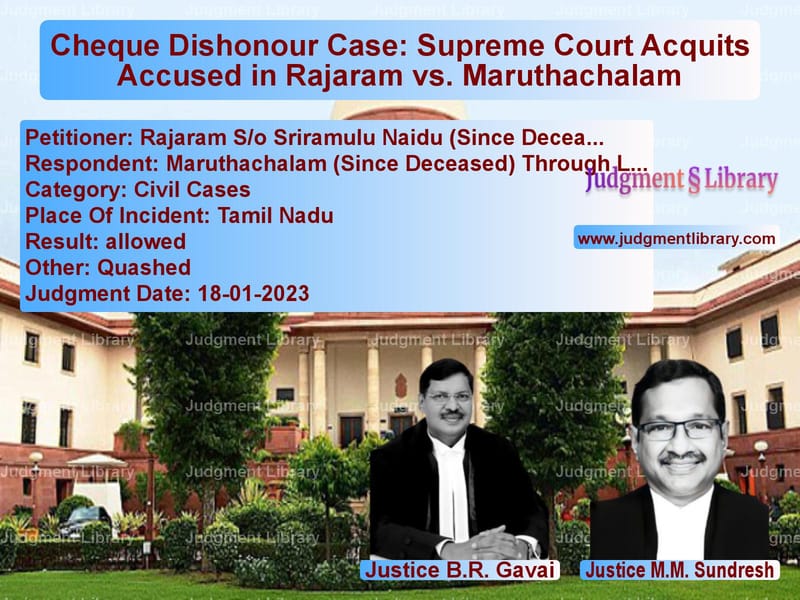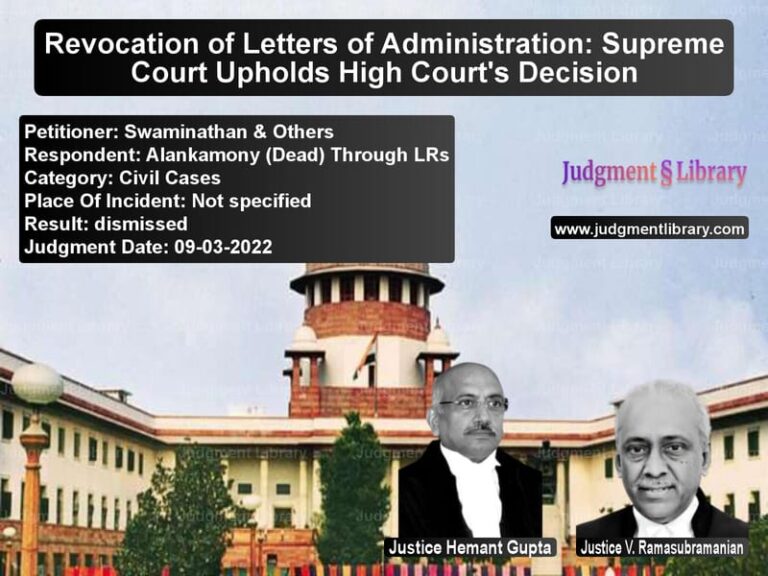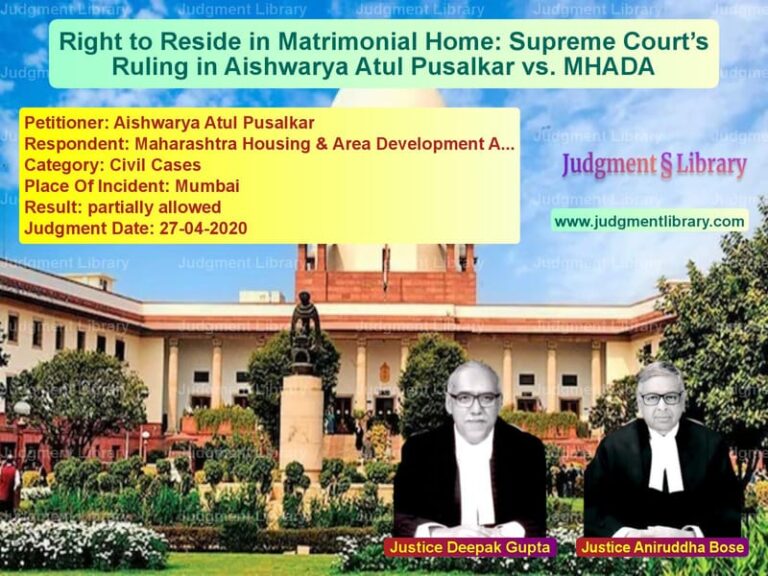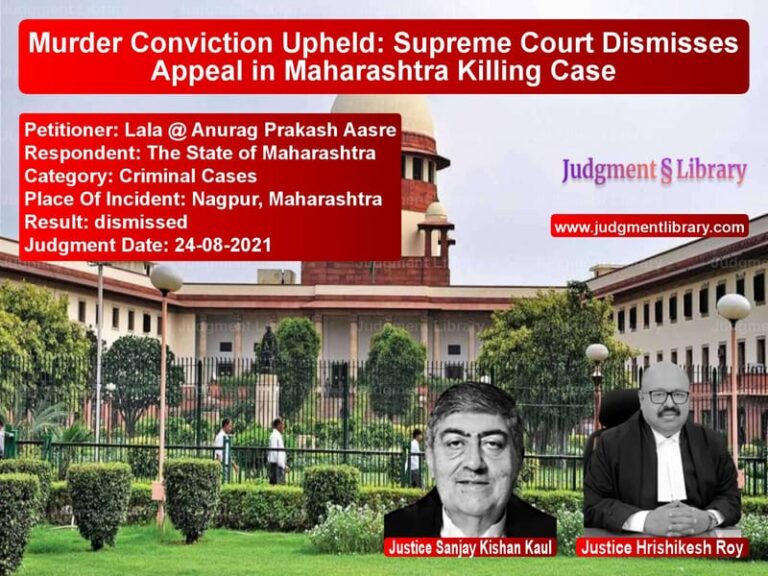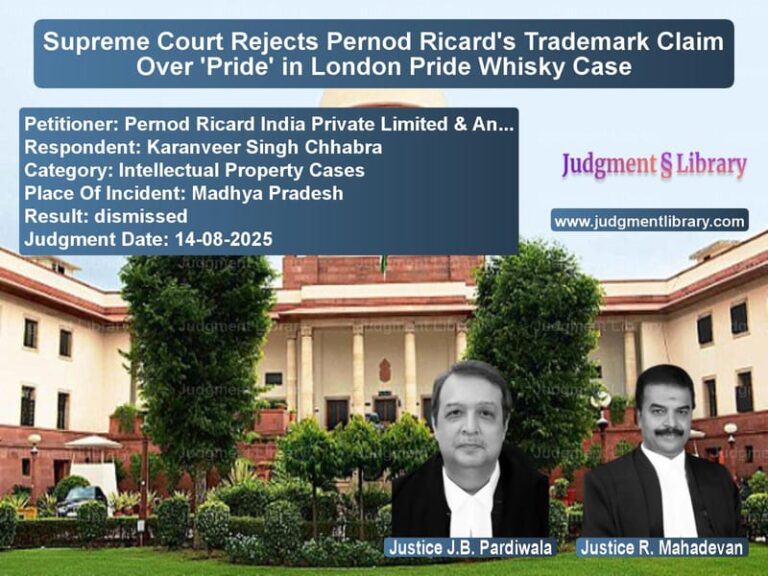Cheque Dishonour Case: Supreme Court Acquits Accused in Rajaram vs. Maruthachalam
The Supreme Court of India recently ruled in the case of Rajaram vs. Maruthachalam, a significant decision concerning cheque dishonour under the Negotiable Instruments Act, 1881. The case involved a long-standing dispute regarding alleged financial transactions, blank cheques given as security, and their subsequent misuse.
Background of the Case
The case dates back to the early 1990s when the appellant, Rajaram, and his wife were subscribers to a chit fund run by the respondent, Maruthachalam. The appellant claimed that, as part of the chit fund agreement, he had issued blank cheques as security. However, after the chit matured, the amount was not paid, leading to a financial dispute.
In 1999, the appellant closed the bank account associated with the issued cheques due to non-operation. The respondent later presented two cheques—one for ₹3,50,000 dated October 20, 1999, and another for ₹3,50,000 dated October 25, 1999. Both cheques were dishonoured due to the closure of the bank account.
The respondent issued a statutory notice demanding payment, which the appellant denied, stating that there was no legally enforceable debt. Subsequently, the respondent filed criminal complaints under Section 138 of the Negotiable Instruments Act. The trial court dismissed the complaints, but the Madras High Court reversed the acquittal and convicted the appellant. The appellant then approached the Supreme Court.
Arguments by the Appellant (Accused)
- The cheques in question were given as security for a chit fund subscription and were not meant to discharge any existing debt.
- His bank account had been closed in 1997, and he was no longer operating the business linked to the account when the cheques were allegedly issued in 1999.
- The respondent had failed to prove that the appellant had any legal liability or outstanding debt at the time of the cheque presentation.
- The respondent’s financial capacity to lend ₹6 lakhs was questionable, as his income tax records did not reflect such transactions.
- The trial court had rightly dismissed the case, and the High Court erred in reversing the acquittal.
Arguments by the Respondent (Complainant)
- The cheques were issued towards a legally enforceable debt arising from a loan given to the appellant.
- The appellant had borrowed ₹3,00,000 in 1998 and issued the cheques in 1999 to settle the debt.
- Since the cheques were dishonoured due to the account closure, it was evident that the appellant intended to evade payment.
- The complainant had filed both criminal and civil suits for recovery, and the High Court rightly ruled in his favour.
Supreme Court’s Observations
- “Once the execution of a cheque is admitted, Section 139 of the Negotiable Instruments Act mandates a presumption that the cheque was for the discharge of any debt or other liability.”
- “The presumption under Section 139 is a rebuttable presumption, and the burden lies on the accused to prove that there was no outstanding liability.”
- “The appellant successfully demonstrated that the cheques were given as security and that no loan transaction took place.”
- “The complainant’s income tax returns did not reflect the alleged loan transactions, raising doubts about his financial capacity to lend such an amount.”
- “The trial court correctly evaluated the evidence and acquitted the appellant, and the High Court should not have interfered without finding any perversity in the trial court’s reasoning.”
Final Judgment
- The Supreme Court set aside the conviction and restored the trial court’s acquittal of the appellant.
- The Court ruled that the prosecution had failed to establish a legally enforceable debt beyond reasonable doubt.
- The presumption under Section 139 of the Negotiable Instruments Act was successfully rebutted by the appellant.
- The appeals in the criminal cases were allowed, and the conviction was quashed.
- The civil suits were also dismissed, but the Court modified the decree, restricting it to the amount already deposited by the appellant in the proceedings.
Legal Precedents Considered
- Basalingappa vs. Mudibasappa (2019): Held that the presumption under Section 139 of the NI Act is rebuttable by preponderance of probabilities.
- Bir Singh vs. Mukesh Kumar (2019): Reaffirmed that signed cheques carry a presumption of liability unless effectively rebutted.
- Kalamani Tex vs. P. Balasubramanian (2021): Emphasized that mere denial by the accused is not enough; rebuttal must be based on cogent evidence.
Implications of the Judgment
- The ruling reinforces that cheques given as security are not automatically considered payments for a debt.
- It clarifies that an accused can successfully rebut the presumption under Section 139 of the NI Act if they present sufficient evidence.
- The decision serves as a precedent in cases where financial capacity and proof of lending are in dispute.
- It highlights the importance of financial records in proving loan transactions in cheque dishonour cases.
Conclusion
The Supreme Court’s judgment in this case underscores the importance of evidence in cheque dishonour cases under the Negotiable Instruments Act. While the law presumes that a cheque represents a legally enforceable debt, this presumption can be rebutted if the accused provides a plausible explanation supported by evidence. The ruling serves as a critical reference for cases involving security cheques and ensures that false claims are not used to exploit legal provisions.
Petitioner Name: Rajaram S/o Sriramulu Naidu (Since Deceased) Through L.Rs..Respondent Name: Maruthachalam (Since Deceased) Through L.Rs..Judgment By: Justice B.R. Gavai, Justice M.M. Sundresh.Place Of Incident: Tamil Nadu.Judgment Date: 18-01-2023.
Don’t miss out on the full details! Download the complete judgment in PDF format below and gain valuable insights instantly!
Download Judgment: rajaram-so-sriramul-vs-maruthachalam-(since-supreme-court-of-india-judgment-dated-18-01-2023.pdf
Directly Download Judgment: Directly download this Judgment
See all petitions in Cheque Dishonour Cases
See all petitions in Contract Disputes
See all petitions in Judgment by B R Gavai
See all petitions in Judgment by M.M. Sundresh
See all petitions in allowed
See all petitions in Quashed
See all petitions in supreme court of India judgments January 2023
See all petitions in 2023 judgments
See all posts in Civil Cases Category
See all allowed petitions in Civil Cases Category
See all Dismissed petitions in Civil Cases Category
See all partially allowed petitions in Civil Cases Category

